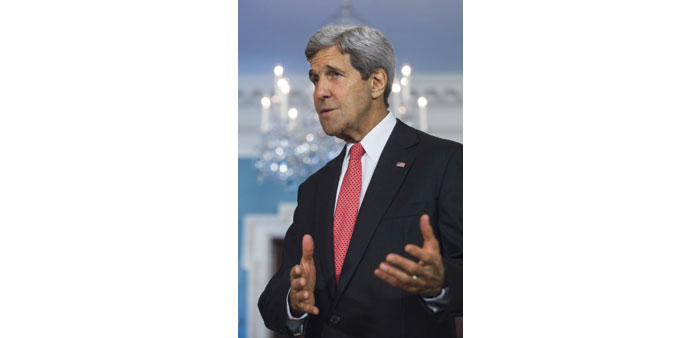AFP
Dubai
US Secretary of State John Kerry said in an interview broadcast yesterday that he intends to reassure Gulf Arab states about the nuclear agreement signed last week with Iran.
“I am going to go through in great detail all of the ways in which this agreement, in fact, makes the Gulf states and the region safer,” Kerry told Saudi-owned Al-Arabiya television.
He was speaking ahead of a meeting on August 3 in Qatar with the foreign ministers of the six-nation Gulf Co-operation Council (GCC).
Kerry said he would also discuss with the ministers what they and Washington could do “to push back against the terror and counterterrorism efforts and other activities in the region that are very alarming to them”. He said he thought the talks would be “very reassuring”.
Kerry downplayed fears that the lifting of sanctions and subsequent unfreezing of its funds would see Iran strengthen its army and its allies in the region.
Asked about comments by Iranian supreme leader Ali Khamenei, who denounced what he called US “arrogance” and said the battle against it would continue, Kerry said: “If it is the policy, it’s very disturbing.”
“But that’s one of the reasons for my meeting with all of the Gulf states; it’s one of the reasons for our being very attentive to guaranteeing the security of the region.”
The GCC on Monday had protested at “contradictory” signals coming from Iran since its nuclear accord struck with the world powers in Vienna last week.
GCC chief Abdellatif Zayani said Iranian President Hassan Rouhani was offering to turn a “new page” with its Arab neighbours while Khamenei had pledged to keep up support for Shia opposition groups.
Such messages sent out “contradictory” signals, Zayani said in a statement, adding that Khamenei’s comments, made in a speech on Monday, amounted to “unacceptable interference” in the affairs of Arab states.
The speech was contrary to “the principles of good neighbourliness”, charged Zayani, vowing that the Gulf Arab states would “continue to defend their interests”.
Meanwhile, US Defence Secretary Ashton Carter has sought to reassure Middle East allies over the Iran nuclear deal during a regional tour.
Addressing military personnel from six nations in an anti-militant coalition at a Jordanian airbase, he said the United States and Israel had a “common commitment to countering Iranian malign influence in the region”.
Israeli Prime Minister Benjamin Netanyahu had “made it quite clear that he disagreed with us with respect to the nuclear deal and Iran. But friends can disagree,” Carter said.
Carter is due in Saudi Arabia today.
Under the July 14 agreement, Iran agreed to dismantle or mothball much of its nuclear industry in return for an easing and eventual lifting of sanctions.
Tehran insists its nuclear programme is peaceful.
World powers called it an historic opportunity to set relations with Iran on a new path, but the deal has faced opposition from hardliners both in Tehran and Washington.
Yesterday, Iranian Foreign Minister Mohamed Javad Zarif defended the agreement in a speech to parliament in Tehran, saying “we should not forget that any deal is a give and take”.
“Each side gives up part of its demands to realise the more important part until what has been given and received is balanced,” he said.
Meanwhile, the White House has launched a new Twitter account to defend the Iran nuclear deal, as US lawmakers prepared to debate the long-negotiated agreement.

Kerry: downplays fears
